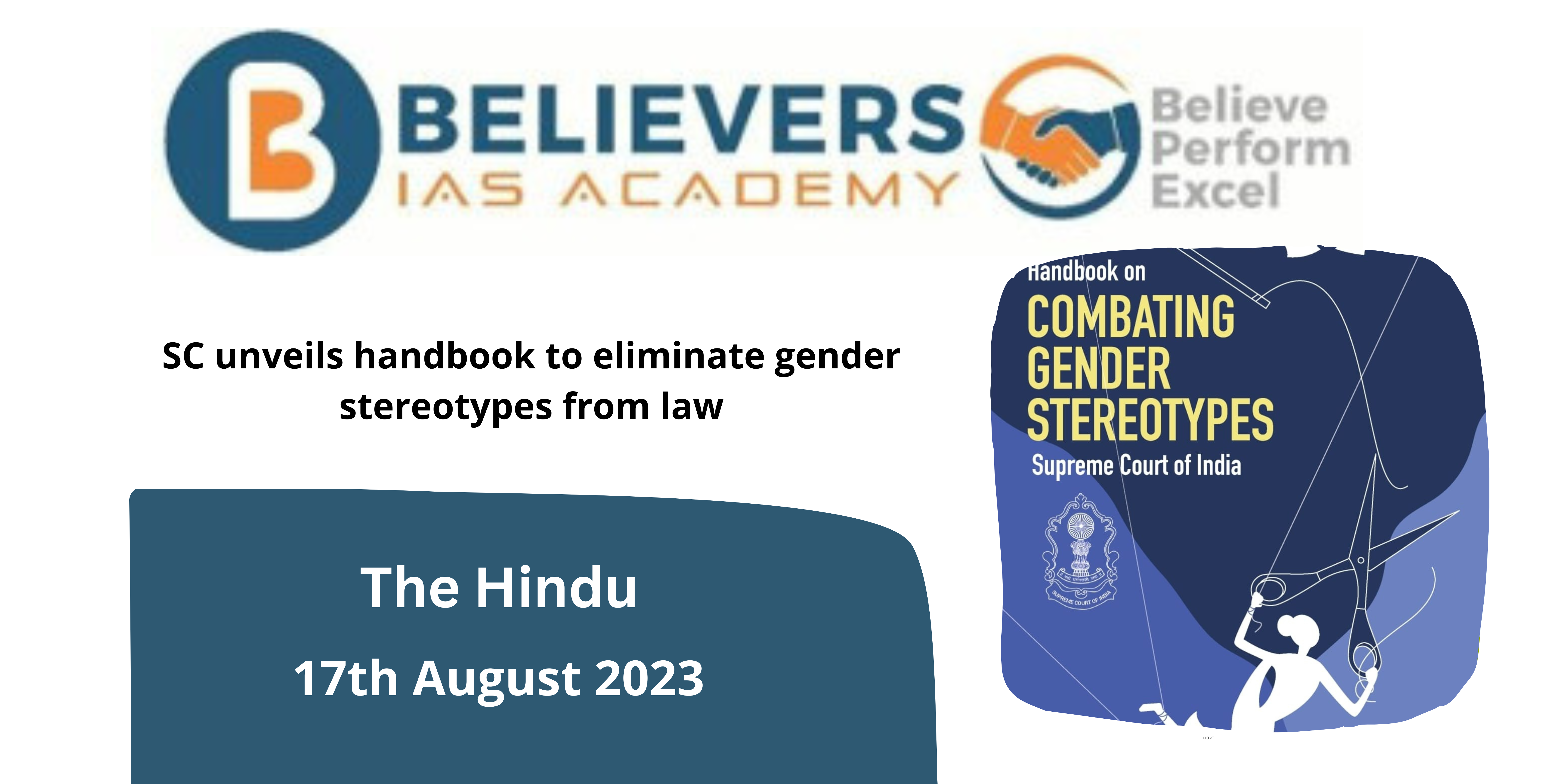SC unveils handbook to eliminate gender stereotypes from law
Context
Career woman, fallen woman, faithful or obedient wife, eve-teasing, hermaphrodite, and many other terms have been labelled by the Supreme Court as being gender-injust in Indian courts. The Supreme Court provided the correct phrases that should be used in their newly released guidelines on Wednesday: woman, woman, wife, street sexual harassment, and intersex.
What is Handbook on Combating Gender Stereotypes?
The Supreme Court of India published a booklet titled “Handbook on Combating Gender Stereotypes” that offers guidelines and suggestions for adopting gender-neutral and equitable language in judicial proceedings, decisions, orders, and court documents. The manual tries to counteract the pervasive use of stereotypical language and gender prejudice in the legal profession, which can support unjust views and attitudes toward people based on their gender.
What are the key features of the Handbook?
- Eliminating Gender Stereotypes: The manual aims to confront and get rid of language that perpetuates gender prejudices and stereotypes, especially in judicial procedures. By promoting the use of neutral and respectful terms, it seeks to establish a more inclusive and just legal environment.
- Gender Equality: The manual promotes the idea of gender equality by suggesting gender-neutral words and phrases. It acknowledges that language shapes societal attitudes and perceptions in a significant way and that utilizing gender-neutral terminology can help create a more equal society.
- Fair Judgments Encouraged: The manual places a strong emphasis on the idea that judgments and legal decisions should be made without regard to gender stereotypes and based on each case’s merits. Fair and impartial assessments can be helped by using neutral language.
- Raising Awareness: The manual educates the legal profession on the influence of language on the attitudes and perceptions of women and people of other genders. It emphasizes the duty of legal practitioners to use their linguistic choices to promote a more just and equal society.
- Reflecting Constitutional Values: The manual adheres to India’s constitutional principles, which support equality and discrimination. It underscores that the language used by judges and other legal professionals should preserve the dignity of all people and represent these basic principles.
- Educational Resource: The guide is intended to educate judges, attorneys, and other legal professionals about the value of using gender-neutral language and about the potential effects of gender prejudice in courtroom discussions.
What are the examples of Gender Un-just Terms identified?
- Several words that are often used in Indian courts have been deemed gender-insensitive by the Supreme Court of India.
- These expressions include, for instance, “career woman,” “fallen woman,” “faithful or obedient wife,” “eve-teasing,” and “hermaphrodite.”
- These phrases reinforce biased views about the roles and skills of women and help to perpetuate gender stereotypes and biases.
What is the role of the Handbook in the Judiciary?
- The manual’s major objective is to expose and combat the usage of gender stereotypes in legal terminology and thought patterns.
- The legal profession and the court can help create a just and fair society by employing language that is more inclusive, neutral, and objective.
How is it going to help the Women?
- The guide admits that, particularly in situations involving women, gender stereotypes can affect courtroom behaviour.
- A woman’s behaviour and remarks in court may be interpreted differently if assumptions are made about her based on her sexual preferences or past.
- These presumptions could minimize the importance of consent in intimate relationships in situations involving sexual assault.
Conclusion
In conclusion, the Supreme Court of India’s guidebook aims to replace gender-insensitive terminology in the legal field with fair and gender-neutral terminology. With this campaign, we want to dispel the incorrect perceptions, prejudices, and stereotypes that have historically shaped the judicial system. The legal profession and the judiciary can help create a society that is more inclusive and just by employing language that respects the values of justice, equality, and respect.




